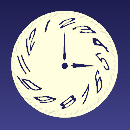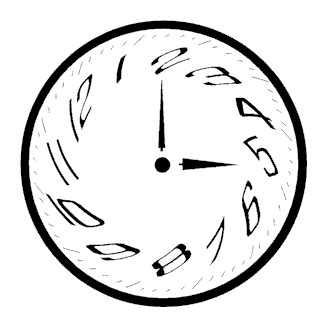

Delayed Sleep Phase Disorder (DSPD), also known as Delayed Sleep Phase Syndrome (DSPS), is a neurological sleep disorder in which a person's sleep/wake cycle is delayed with respect to the external day/night cycle. The person is unable to fall asleep until the wee hours, typically somewhere between 2 am and 6am, and sleeps correspondingly longer in the daytime, often well into the afternoon.
The official designation according to the current International Classification of Sleep Disorders (ICSD-3, published in 2014) is Delayed Sleep-Wake Phase Disorder. The previous edition (ICSD-2, 2005) called it Circadian Rhythm Sleep Disorder - Delayed Sleep Phase Type. The version before that (ICSD-R, 1997) used the name Delayed Sleep Phase Syndrome, and that has been widely used in the medical literature and in many popular articles and web sites. Delayed Sleep Phase Disorder is now also commonly used, and we use it here. The DSM-5 (2013) refers to it as Circadian Rhythm Sleep-Wake Disorder - Delayed Sleep Phase Type.
No, DSPD is a neurological disorder. However the stress of living with DSPD can lead to psychological problems including depression. This is compounded by the lack of understanding from family, friends, employers and even some doctors. It is difficult for most people to understand that abnormal sleep hours may be inflexible and out of a person's control. The resultant lack of acceptance may seriously undermine the employment, relationships, and self-esteem of a person with DSPD.
Many people try to cope with DSPD by forcing themselves to keep a normal schedule. This results in a chronic sleep deficit, with symptoms that can mimic depression, attention deficit hyperactivity disorder, chronic fatigue syndrome, fibromyalgia, or just plain fatigue. A patient who complains about not being able to fall asleep may be misdiagnosed with primary insomnia, and prescribed sleep medication. A patient who complains about being tired all the time may be misdiagnosed as suffering from depression, and prescribed antidepressant medication. In some cases, of course, the patient is suffering from depression, but that may be secondary, a result of constant struggle with fatigue or failure at work or school.
DSPD people really are unable to fall asleep earlier. DSPD is not simply a "night owl" tendency, in which people prefer to stay up late and get up late, but are able to adjust to a daytime schedule when necessary. With DSPD, the body clock is not just delayed, it is also inflexible.
Some DSPD people will fall asleep earlier, but won't get restorative sleep. Others cannot fall asleep earlier no matter how tired they feel.
Many people with DSPD sleep very soundly. If they have to get up for work at a time their misaligned body clocks consider sleep time, they may not hear alarm clocks. They may be awakened, with difficulty, only to fall back to sleep again. This is especially true if they have already become sleep deprived.
People with DSPD who try to work normal work hours, such as 9 am to 5 pm, or students who have to attend morning classes, become sleep deprived. This is because, no matter how tired they get, they cannot fall asleep earlier. Yet they still have to get up early. So they may only get 3 or 4 hours of sleep each night. Their work suffers. They may become accident-prone. Continuing sleep deprivation affects their health, both physical and mental.
Parents who have DSPD may have to be awake early in the morning to feed their kids and get them off to school. Other issues can include difficulty finding and maintaining relationships on such an unusual schedule, shopping when the stores are open, and being awake for early appointments with repair people and doctors.
More awareness that DSPD is a real disability is needed, together with greater willingness to discuss it in terms which don't blame the individual. Such understanding would also further efforts to find suitable accommodations.
There are many long-term health effects of sleep deprivation. These can include depression, lowered immune response, anxiety disorders, weight gain, fibromyalgia, diabetes, and cancer.
Many people with DSPD feel rested and alert if they can sleep during the hours their bodies require. But others are chronically tired, even if they can sleep as their circadian rhythms dictate. Research suggests that some of their internal systems may be out of sync with others - for example, their digestive system may not be in sync with their sleep/wake system, similar to jet lag. Many DSPD people need more sleep than normal sleepers.
Two studies in the 1990s found that DSPD affected about 1 in 600 adults. It affects many more adolescents. Most adolescents grow out of it, but some do not.
For some, DSPD starts in infancy or early childhood. For others, it starts during puberty. For some of these, it also ends in their early twenties, but for others it is lifelong.
A sleep specialist will generally discuss a patient's history and complaints. If a circadian rhythm disorder is suspected, the doctor will require a log of when the patient sleeps and wakes. This may be obtained by using a wrist activity monitor, a device worn like a wristwatch which tracks movement. The sleep history is most useful if it can be obtained when the patient is sleeping on her natural schedule, without attempting to meet the requirements imposed by work or school. Many patients will have already researched circadian disorders, and come prepared with a sleep log.
Often the sleep doctor will order an overnight polysomnogram (sleep study), to detect or to rule out other disorders such as sleep apnea or PLMD (Periodic Limb Movement Disorder). For people with DSPD, this test should be performed when the patient can sleep normally, which may be later than the lab's usual schedule allows. Some doctors will ask for a Multiple Sleep Latency Test (MSLT) to be conducted during the patient's day, to evaluate the possibility of narcolepsy. In some patients, multiple disorders may be present, or another disorder may be the cause of the reported symptoms.
Sleep doctors attempt to treat DSPD by prescribing bright light in the morning, restricting light exposure in the evening, and/or prescribing the hormone melatonin in the evening, in an attempt to shift the body's circadian rhythm. This may be effective for some people, but is not for others. Many doctors prescribe medication to help people sleep. This can help some people get to sleep earlier, but often it does not improve the quality of sleep, and the patient remains tired during the day. Many people react to the medications and must stop taking them, and some people find them ineffective.
Sleep doctors may suggest phase-delay chronotherapy, delaying the sleep schedule by moving it later and later to go around the clock until the desired sleep time is reached. This may work for patients unable to move their schedule earlier. Even when it succeeds, many find they feel disoriented and tired, and struggle with the new schedule. Others find they revert quickly to their body's preferred schedule. Also, there is a risk that this treatment may cause the DSPD to progress into non-24-hour sleep-wake disorder, which is far more difficult to live with.
For many DSPD people, sleeping on a normal schedule may be difficult or impossible and trying to do so only results in sleep deprivation and stress, with all the harmful health effects that can cause. They find they can be much more productive and much happier living on the schedule to which their body naturally reverts. For people with severe cases, this may be the only realistic option.
You would initially fall asleep earlier (on the local clock), but since circadian rhythms synchronize relative to the light/dark cycle you would almost certainly slip back into sleeping late in the new time zone as well. The experience of many people with DSPD who have changed time zones confirms this; despite efforts to stay on the new schedule they report relapsing within days to weeks.
For those for whom treatment is ineffective, DSPD can make it impossible to maintain a 9 am to 5 pm work schedule. Most jobs require hours such as these. For those who have such jobs, as well as students who are required to attend morning classes, if treatment fails, DSPD is a disability. Schools and employers in the U.S. are required, under the Americans with Disabilities Act, to provide reasonable accommodations, including part-time or modified work schedules. Sleep disorders qualify students for a Section 504 plan. Consult a lawyer for details. Other countries may require similar accommodations.
Scheduling work hours later in the day. An hour or two can make a big difference for some. Allowing workers to work from home, at the times they can. Permitting shorter work hours, at correspondingly lower pay, for those that need this because of chronic tiredness. For students, allowing them to take courses given at later times, or recorded on video, or online; or recognizing that they may miss some classes, but may be able to keep up with the coursework nonetheless. Providing for exams to be given at an appropriate time. Allowing a lighter course load, even if this means delaying graduation.
DSPD does not affect intelligence. But study, concentration, memory, and attention span are affected by sleepiness. Adjustments in study habits may be necessary. This can best be accomplished with the cooperation of school personnel. It is important to identify children with DSPD at the earliest possible age to prevent a pattern of failure from developing, thus fostering low self-esteem.
There is work being done on the basic nature and function of sleep, which is still not really understood. There is progress on the genetic, neurological, and chemical pathways involved in the circadian clock. Studies have been done with animals, and in some cases with normal human subjects, but seldom with DSPD patients. There is continuing research on the effects of light, dark, and melatonin on the circadian rhythm. More needs to be done to unravel the underlying causes of this disorder.
 Circadian Sleep Disorders Network is a 501(c)(3) nonprofit organization promoting awareness, accommodation, support, and research for Circadian Rhythm Sleep Disorders. See our web site,
www.CircadianSleepDisorders.org
(shortcut: csd-n.org) for details, for more information about these disorders, and to print this and similar
documents, which may be freely distributed. And please join
if you or your child is affected by DSPD!
Circadian Sleep Disorders Network is a 501(c)(3) nonprofit organization promoting awareness, accommodation, support, and research for Circadian Rhythm Sleep Disorders. See our web site,
www.CircadianSleepDisorders.org
(shortcut: csd-n.org) for details, for more information about these disorders, and to print this and similar
documents, which may be freely distributed. And please join
if you or your child is affected by DSPD!